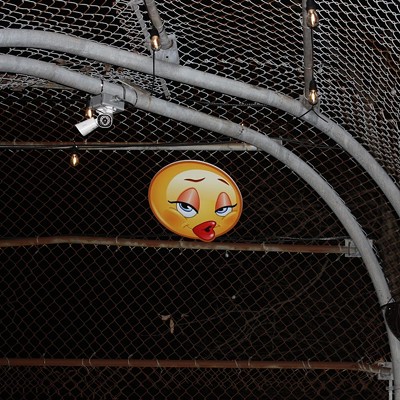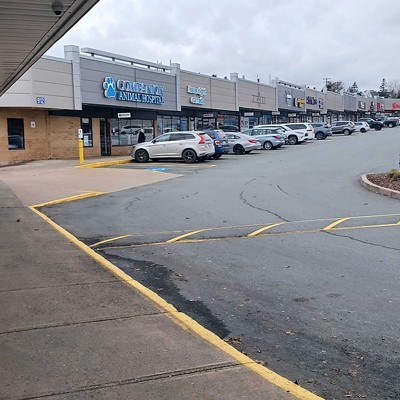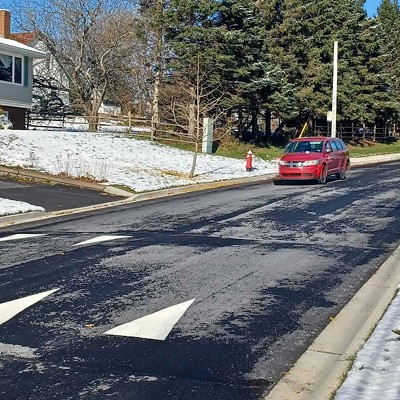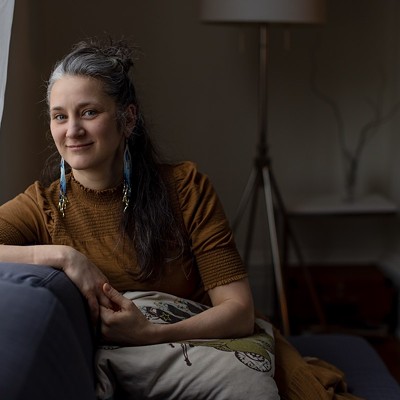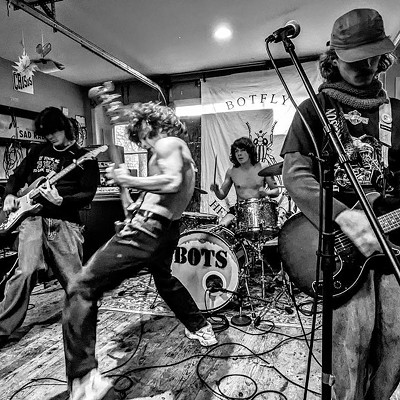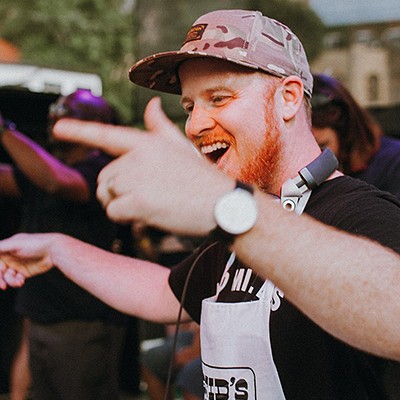A year ago, 26-year-old Tanya Davis had no friends to hang out with. She had just moved to Halifax from PEI to pursue a career as a poet/writer/musician, but had no connections and no album to peddle. She spent her afternoons at Steve-O-Renos writing and thinking, and her nights at live shows hoping to connect with other musicians.
Six months later, Tanya Davis stood softly before an open mic at One World Cafe on Agricola Street in jeans and a baggy sweater, her long brown hair pulled back into a loose ponytail, and apologized to the audience for not having yet committed her new poem to memory. She took the mic in her right hand, and, reading from the small piece of white paper in her left, proceeded to blow the minds of the dozen or so people in the room with an intensely personal, lyrically rhythmic exploration about whether or not she needed love in her life.
Six days ago, Tanya Davis was on her way to Liverpool for Nova Scotia Music Week, where she would again stand in front of a mic. This time, her thick hair cut into layers, she played in front of a packed room sporting a skirt, tall boots and a band. This time, she also stood to win awards in four categories, including New Artist/Group of the Year, and for her debut CD, Make a List, Female Recording of the Year, Alternative Recording of the Year and finally, the coveted Album of the Year. Ultimately, she would be beat out in all categories, but the mere nominations served as a loud announcent of her arrival.
So who is Tanya Davis? As a practitioner in the spoken word genre, and a very new musician to the Halifax scene, it’s not surprising that most people don’t know of her. Also not surprising is that, likely, they soon will.
“Her lyrics are of a mature songwriter,” says Gordon Lapp, the executive director of Music Nova Scotia. “Her messaging is incredible for someone that young. She’s got the attention of a lot of people. She’s turning heads.”
Lapp describes Davis’ sound as “Leonard Cohen meets Sarah Harmer” which is apt, referencing her melding of the singer-songwriter and poetry genres. But she sounds like neither. In fact, it’s almost impossible to point to a known artist whose sound is comparable. Six of the nine songs on her CD, Make a List, are mostly spoken word enhanced by musical accompaniment (Davis plays guitar, ukele and bass on the album). The other three tracks are folk songs with Davis singing throughout, ranging in tone from wistful (“Potato”) to playful (“The Drums”) to thoughtful (“Something”).
Her voice is soft and velvety with a slightly gauzy texture. She enunciates her consonants and one can almost hear a lilt, likely her PEI heritage. The track “Sometimes” offers nuances of Dolores O’Riordan Burton from The Cranberries. No, Tanya Davis is not a Sarah Harmer wannabe. Nor Sarah McLachlan, or any other girl-with-guitar artist you can name.
“She has a delicate strength to her voice, like Feist, or Gillian Welch,” says Davis’ keyboardist, Don Brownrigg, “but there’s no one really like her.”
Davis is making a name for herself as a poet and a writer, and for that she’s pleased. But it’s not enough. She wants to put out pop songs as well. If that sounds random, it isn’t. She’s hard to pin down on purpose.
“I’ve never really felt like I fit in anywhere,” she says. “I don’t want to be just known as a poet, or as a girl who plays guitar.” On her MySpace blog, she writes, “I want to have a group of people on stage with me…and we can rock people’s socks off. or, maybe we can folk people’s socks of, or pop them off, or indie them off…you see where I’m going with this: it’s hard to define what kind of music I play...but I’m even happier to play music AND do poetry.” She goes on to explain how excited she is to “introduce unsuspecting haligonians to another style of poetry. musical poetry. poem songs. pongs.”
Musical stylings aside, what sets Davis apart is her approach to verse. Her writing is direct and naked, unobscured by metaphor or heavy symbolism. And within the arrangement, the lyrics always take centre stage whether she is performing solo, accompanied by an instrument or two, or a full band. The power is in her directness.
“What can be compelling about spoken work is the use of language. Language is so powerful and if it’s delivered well…” she trails off. “Writing for performance is different than for it to remain in the page. It’s infinite what someone could say up there. There’s a privilege—we can say what we want.”
Her influences reflect that. They include Kinnie Starr, Shane Koyzcan, Bright Eyes, John K. Sampson of The Weakerthans and locally Shauntay Grant, Benn Ross and Amelia Curran. For Davis, performance was an afterthought—hard to grasp given that she’s played musical instruments most of her life including piano and flute and, even in conversation, her voice is captivating.
“Performance wasn’t ever what I saw myself doing. I’ve always wanted to be a writer,” she says, sitting in her kitchen on a leafy street in Halifax. She studied English at university, but dropped it, deciding she didn’t need a degree for that, choosing instead to move to Ottawa to take health sciences.
“Poetry has a bad rap,” she says. “The poetry I learned in school didn’t interest me. In general, poetry can be ‘blahh poetry’…but people come up to me and say ‘I don’t really like poetry, but I like that,’” as in what she just did.
Davis writes frequently about love, sharing personal stories of people who’ve come in and out of her life. She also uses her writing to explore larger ideas and to voice the questions she’s left with. In “Art” she challenges the relevance of her own passion: “I wondered what would be the worth of my words in the world/If I write them and then recite them, are they worth being heard?/Just because I like them, does that mean I should mic them and see what might unfurl?”
Similarly, in “Keep it on My Fridge” she writes of making a list of all the things she isn’t doing: “I could do more favours/help more old ladies cross the street/Savour my chocolate and behave more neighbourly/I could do lots of things.” Only to then interrogate herself as to her motives: “And if I became this magnanimous person maybe I would win/Or maybe it’s just a means to ease my conscience/Make a list and cross things off of it.”
What Davis doesn’t dispute is her need to feel. “I’m a Leo, I love to be in love,” she says. “I fall easily in love.” And she writes of this most movingly. Several of the songs on her CD are about love affairs, some that have fallen by the wayside, some of convenience and some written during the throws of infatuation. It is intensely personal and honest writing and looked at as a whole, Make a List speaks volumes about the complex nature of relationships. In “Something” she sings to an occasional lover: “We have no time for this/Some kind of lovers and some kind of friends/And if you had a type I wouldn’t be it/But we have something, we have something.”
While in the track “Long Distance” she sings to a former girlfriend: “We were a good fit/And if we would have moved in we would have had a good kitchen and cooked the best food/But we didn’t/You stayed in that city and I came to this one/Now things are different.”
Davis is as candid in person as she is on stage. Born 27 years ago in Summerside, PEI, she led a typical life in a small rural town. She was good in school, played sports, had a boyfriend, whom for a while she thought she might marry. But she was miserable and didn’t know why.
“I just fit in OK,” she says. “I wanted people not to notice me. Inside I was really tormented. I was stifled and I didn’t know I was.” She says she didn’t figure out she was gay until after high school, but was “just really messy and over-emotional.”
She eventually hitchhiked to BC—she wouldn’t do it again—where she discovered spoken word, and politics, and cooking. “I grew up on processed food in PEI,” she says. “In BC I dated someone at a culinary institute and it was like ‘Oh, and avocado. Cool!’” She also had her first all-consuming relationship there, during which she says she lost her writing. “I used to be fuelled by misery. I used to be a crier. I cried every day. I was that tortured artist. I was high-low, high-low, but I’ve found that balance. Now I think that’s kind of bullshit for me.”
Currently single, Davis says she hasn’t tested her ability to be in a relationship while retaining her discipline for writing, but love continues to be a strong theme in her work. Moving back to the east coast to “hit the reset button” she says, has given her the focus, community and—judging by the musical community’s profoundly positive response—the support she’s needed to go forward.
“I’m happier now than I’ve ever been,” she says, “I feel fulfilled.”
And forward is where Tanya Davis is headed.
Tanya Davis plays Ginger’s on November 22 and the Seahorse on November 25.
Shayla Howell is a freelance journalist and TV segment producer. She’s spent the last two months on blustery, beautiful PEI having drinks at the Blue Fin and seeing movies at an actual rep theatre.


